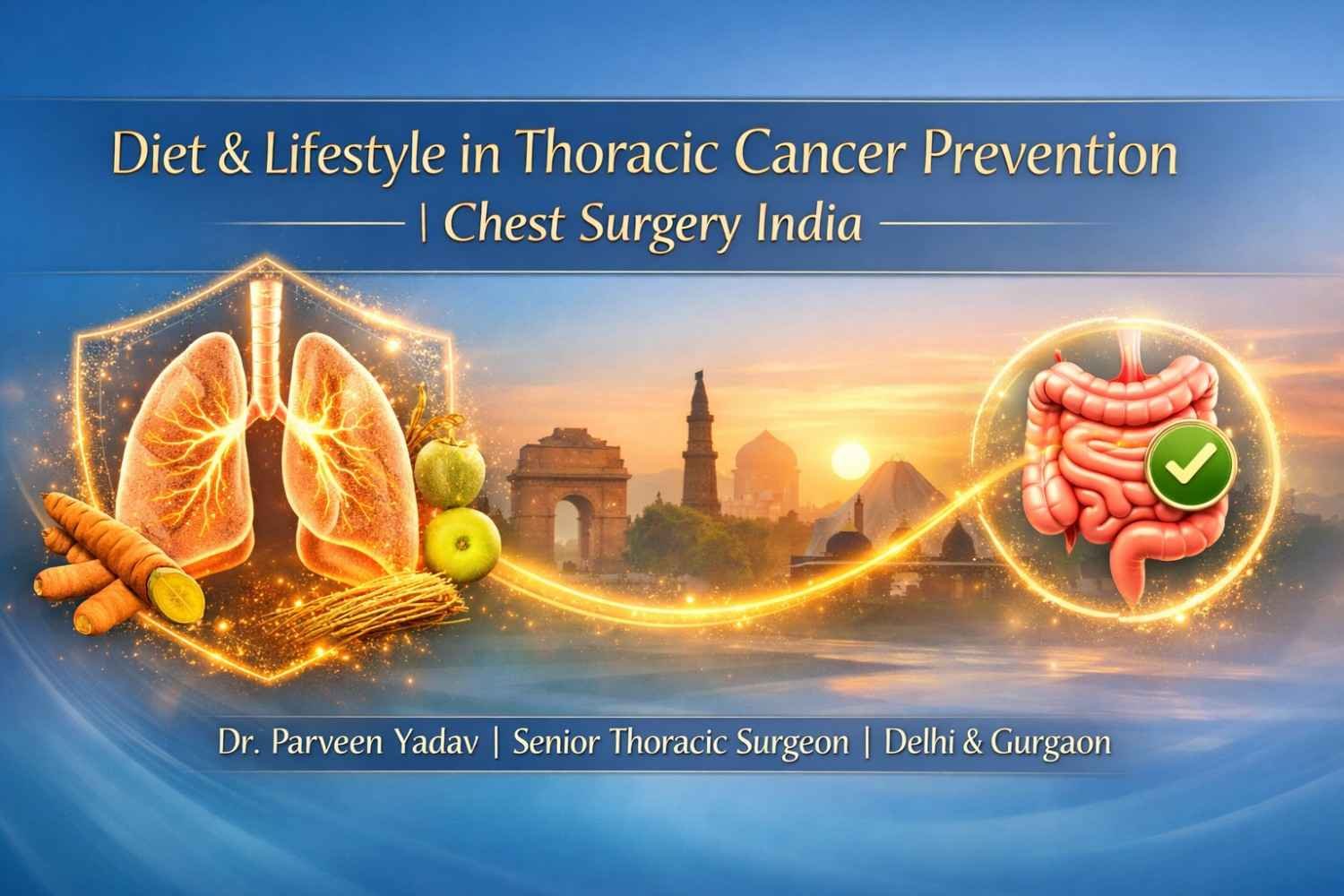

Thoracic oncology, the field dedicated to treating chest cancers, encompasses a range of malignancies, including lung cancer, mesothelioma, and thymus cancer. Given the complexity and aggressiveness of these cancers, a holistic and integrated treatment process is crucial. This is where it comes into play.
In thoracic oncology, multidisciplinary care involves a team of specialised healthcare professionals working collaboratively to provide comprehensive and personalised patient treatment plans. This procedure has significantly improved patient outcomes and quality of life.
Thoracic oncology deals with cancers originating in the thoracic cavity, including the lungs, esophagus, and other organs within the chest. The most familiar types of thoracic cancers are:
1. Lung Cancer: The highest cause or reason for cancer death worldwide, lung cancer can be categorised into 1—small cell lung cancer (SCLC) and 2. non-small cell lung cancer (NSCLC). According to the World Health Organization, lung cancer accounts for nearly 1.8 million deaths annually, highlighting the urgent need for effective treatment strategies.
2. Mesothelioma: A rare cancer involving the lining of the lungs or abdomen, often linked to asbestos exposure. The American Cancer Society calculates that about 3,000 new mesothelioma patients are analysed annually in the United States.
3. Thymus Cancer: This cancer originates in the thymus gland and includes thymomas and thymic carcinomas. It is relatively rare, with approximately 400 cases diagnosed annually in the United States.
These cancers present with symptoms such as persistent cough, chest pain, shortness of breath, and unexplained weight loss. Risk factors include smoking, exposure to carcinogens, genetic predisposition, and certain underlying health conditions.
Multidisciplinary care in thoracic oncology involves a collaborative approach to treatment, where a team of specialists from various medical disciplines work together to develop and implement a patient's treatment plan. The multidisciplinary team typically includes:
Oncologists: Experts in cancer treatment, including chemotherapy and immunotherapy.
Surgeons: Perform surgical interventions to remove tumours and affected tissues.
Radiologists: Specialise in imaging techniques to diagnose and monitor cancer.
Pulmonologists: Focus on the respiratory system and manage lung health.
Pathologists: Analyse tissue samples to provide accurate diagnoses.
Nursing Staff: Provide care and support throughout the treatment process.
Support Services: Include nutritionists, physiotherapists, and palliative care specialists.
Each team member plays a critical role, contributing their expertise to ensure the patient receives the most effective and comprehensive care possible.
1. Improved Patient Outcomes: Analyses have shown that patients treated by interdisciplinary teams have better survival rates and overall outcomes than those receiving conventional care. The Journal of Thoracic Oncology analysis found that lung cancer patients treated by multidisciplinary teams had a 15% higher five-year survival rate.
2. Comprehensive Treatment Plans: Multidisciplinary teams can tailor treatment plans to each patient's needs, considering all aspects of their health and personal circumstances. This personalised approach ensures that every patient's condition is addressed.
3. Enhanced Communication: Regular meetings and discussions among team members ensure seamless coordination and communication, reducing the risk of errors and omissions. A study by the National Cancer Institute reported that multidisciplinary care significantly improves communication and decision-making among healthcare providers.
4. Increased Patient Satisfaction: Patients feel more supported and confident knowing that a team of specialists is dedicated to their care. Surveys have shown that patients receiving multidisciplinary care report higher satisfaction and trust in their treatment plans.
5. Access to a Range of Treatments: Multidisciplinary teams can offer a broader spectrum of treatment options, including access to clinical trials and advanced therapies. This is particularly important in thoracic oncology, where innovative treatments are continually being developed.
Multidisciplinary care is essential in thoracic oncology. It offers a comprehensive, coordinated, and patient-centered approach to treatment. Leveraging the expertise of different specialists improves patient results, enhances quality of life, and confirms that patients receive the best possible care.
At Chest Surgery India, Dr. Parveen Yadav and his team are dedicated to providing multidisciplinary care to thoracic oncology patients, ensuring they benefit from the latest advancements and a holistic treatment approach.
1. What types of thoracic cancers benefit the most from multidisciplinary care?
Lung cancer, mesothelioma, and thymus cancer benefit significantly from multidisciplinary care due to their complex treatment requirements.
2. How does multidisciplinary care affect the treatment timeline for thoracic cancer patients?
While initial coordination might take longer, it usually results in a more effective and streamlined treatment timeline.
3. Can patients choose their multidisciplinary care team members?
Patients typically do not select individual team members but can express preferences and concerns to influence the team composition.
4. What role do patient navigators play in multidisciplinary care for thoracic oncology?
Patient navigators coordinate care, facilitate communication among team members, and support patients through treatment.
5. How can patients access multidisciplinary care for thoracic oncology?
Patients can access it through specialised cancer centres or hospitals known for comprehensive cancer care programs, often via referrals.
Dr. Parveen Yadav is a highly recommended surgeon or specialist for thoracic oncology treatment in Gurgaon, Delhi. He specialises in minimally invasive and robotic thoracic onco surgery. He has been recognised for 17+ years as the best chest surgeon in Gurgaon, Delhi, for his expertise in treating chest-related (Chest Surgery) ailments, such as Esophageal (Food Pipe Cancer), Lung, Tracheal (Throat), Chest wall tumours, Mediastinal Tumours, Empyema, and Bronchopleural Fistula cancer. With a focus on precision and innovation, he is dedicated to offering exceptional care to his patients, utilising techniques to ensure optimal outcomes.

18+ Yrs Exp | 5,700+ Thoracic & Robotic Cancer Surgeries
Dr. Parveen Yadav is a Director and Senior Consultant in Thoracic and Surgical Oncology, specializing in minimally invasive and robotic lung and esophageal surgeries, with advanced training from AIIMS and Tata Memorial Hospital.
View Full Profile Pain After Thoracic Surgery: Tips for Smooth Recovery
Pain After Thoracic Surgery: Tips for Smooth Recovery
 Diet & Lifestyle for Thoracic Cancer Prevention | Dr. Parveen Yadav
Diet & Lifestyle for Thoracic Cancer Prevention | Dr. Parveen Yadav
 Robotic Thoracic Surgery: How Da Vinci Technology is Revolutionizing Chest Procedures
Robotic Thoracic Surgery: How Da Vinci Technology is Revolutionizing Chest Procedures
Struggling with pain after chest surgery? Dr. Parveen Yadav shares expert recovery tips, causes of shoulder pain, PTPS signs, and what your discharge sheet won't tell you.
Discover how diet, breathing exercises & daily habits help prevent and recover from thoracic cancer. Expert insights from Dr. Parveen Yadav, Chest Surgery India
Discover how Da Vinci robotic surgery is transforming chest procedures in Gurgaon. Less pain, faster recovery & expert care by a certified thoracic surgeon
Copyright 2026 © Dr .Parveen Yadav all rights reserved.
Proudly Scaled by Public Media Solution!